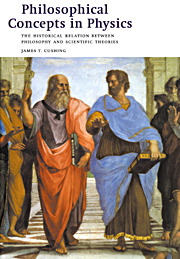 Philosophical Concepts in Physics
Philosophical Concepts in Physics Book contents
- Frontmatter
- Contents
- Preface
- Copyright acknowledgments
- PART I The scientific enterprise
- PART II Ancient and modern models of the universe
- PART III The Newtonian universe
- 7 Newton's Principia
- 8 Newton's law of universal gravitation
- 9 Some old questions revisited
- PART IV A perspective
- PART V Mechanical versus electrodynamical world views
- PART VI The theory of relativity
- PART VII The quantum world and the completeness of quantum mechanics
- PART VIII Some philosophical lessons from quantum mechanics
- PART IX A retrospective
- Notes
- General references
- Bibliography
- Author index
- Subject index
7 - Newton's Principia
Published online by Cambridge University Press: 05 June 2012
- Frontmatter
- Contents
- Preface
- Copyright acknowledgments
- PART I The scientific enterprise
- PART II Ancient and modern models of the universe
- PART III The Newtonian universe
- 7 Newton's Principia
- 8 Newton's law of universal gravitation
- 9 Some old questions revisited
- PART IV A perspective
- PART V Mechanical versus electrodynamical world views
- PART VI The theory of relativity
- PART VII The quantum world and the completeness of quantum mechanics
- PART VIII Some philosophical lessons from quantum mechanics
- PART IX A retrospective
- Notes
- General references
- Bibliography
- Author index
- Subject index
Summary
In this and the next two chapters we discuss the conceptual cornerstone of classical physics, namely Newtonian mechanics. We shall see how Newton, employing certain general principles of reasoning as guides, used the regularities of the solar system, in the form of Kepler's laws, to arrive at his own law of gravitation. He then reversed this reasoning process to derive not only Kepler's laws but also to account for the phenomena of the ocean tides. The stereotypical image of Newton represents him as the embodiment and culmination of the Age of Reason, as in the 1689 Godfrey Kneller portrait of him in the robes of a Cambridge don. It may come as a surprise to learn that Newton had serious and long-standing interests in certain unorthodox theological subjects and in alchemy
ISAAC NEWTON
Isaac Newton was born in the small English village of Woolsthorpe, in Lincolnshire, on Christmas day, 1642, eleven months after Galileo's death. (On the Gregorian calendar that was not adopted in England until 1752, Newton's birth date is January 4, 1643.) His father (1606–1642), also named Isaac Newton, died three months before his son's birth. Newton was a sickly baby and was not expected to live long. In 1645 his mother, Hannah Ayscough (d. 1679), married a wealthy minister, Barnabas Smith (1582–1653), and moved to a neighboring village, leaving young Isaac to be raised by his maternal grandmother.
Information
- Type
- Chapter
- Information
- Philosophical Concepts in PhysicsThe Historical Relation between Philosophy and Scientific Theories, pp. 89 - 102Publisher: Cambridge University PressPrint publication year: 1998